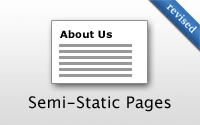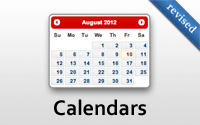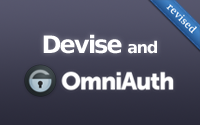Types
- Free Episodes
- Pro Episodes
- Revised Episodes
Categories
- Active Record
- Active Resource
- Active Support
- Administration
- Ajax
- APIs
- Authentication
- Authorization
- Background Jobs
- Caching
- Code Walkthrough
- Controllers
- Debugging
- Deployment
- eCommerce
- Forms
- Mailing
- Models
- Performance
- Plugins
- Production
- Rack
- Rails 2.0
- Rails 2.1
- Rails 2.2
- Rails 2.3
- Rails 3.0
- Rails 3.1
- Rails 3.2
- Rails 4.0
- Refactoring
- Routing
- Search
- Security
- Testing
- Tools
- Views
Applied Filters:
Revised Episodes x
YAML Configuration (revised)
Keeping passwords and secret tokens in source control is a security risk. Here I show how to move these settings out into a YAML configuration file which can be loaded in as a hash or environment variables.
(8 minutes)
jQuery & Ajax (revised)
Here I go back to the basics and show how to turn a traditional Rails app into one that interacts through Ajax by adding "remote" options, JavaScript templates and a dabble of jQuery.
(14 minutes)
Charts & Graphs (revised)
If you have a lot of data, consider adding a graph to provide an overview of it. Here I show how to use Morris.js to chart an Order model and visualize trends in the data.
(12 minutes)
Semi-Static Pages (revised)
There are many ways to handle static pages in a Rails application. Here I show two approaches including one that uses a RESTful style PagesController to keep the content in the database
(8 minutes)
Memoization (revised)
Memoization is a convenient way to cache a method's response. Here I show several ways to accomplish this from scratch since the ActiveSupport::Memoizable module has been deprecated.
(9 minutes)
Calendars (revised)
Learn how to add a calendar to your Rails app. Whether it be a date picker using jQuery UI or a full page calendar for browsing records, I will show you how to do it in this episode.
(9 minutes)
Optimistic Locking (revised)
There is a chance one user will unintentionally override someone else's changes if they update a record near the same time. One solution is to use optimistic locking. The updated_at column can also be used for this as shown.
(8 minutes)
Mongoid (revised)
Mongoid is a Ruby gem for interacting with MongoDB. Here I show the basics of setting up an app, querying for records, adding embedded associations, overriding the id, and more.
(9 minutes)
Virtual Attributes (revised)
Virtual attributes are a clean way to add form fields that do not map directly to the database. Here I show how to handle validations, associations, and more.
(11 minutes)
Devise and OmniAuth (revised)
In this episode I build upon a standard Devise setup and show how to add 3rd party authentication using OmniAuth. This includes support for user validations and is compatible with normal password authentication.
(10 minutes)










